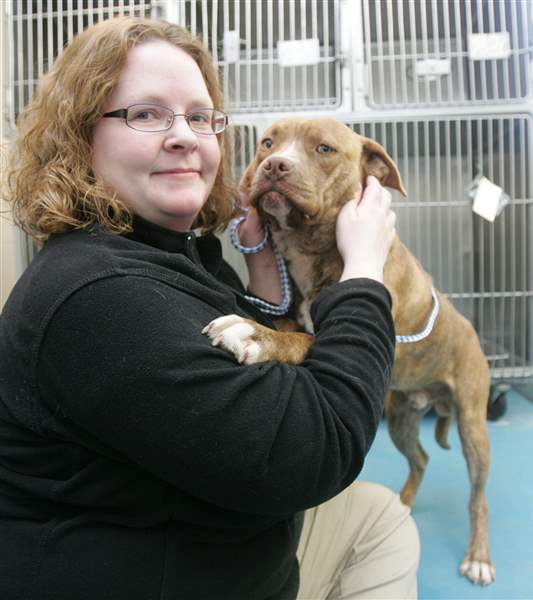
Decision delayed on dog warden's authority
4/21/2010
Amos is one of several 'pit bulls' put aside in case the dogs can be transferred to an animal rescue group.
The Blade/Lori King
Buy This Image
Lucas County Commissioners voted 2-1 yesterday to postpone action on a resolution that would have granted the county's new dog warden some policy-making authority, including the prerogative to start adopting out "pit bulls" to the public.
Commissioner Ben Konop proposed the resolution to ensure that new warden Julie Lyle has the same freedom to operate the department that he says was implicitly given to former dog warden Tom Skeldon, who formally retired Jan. 31 after more than 22 years.
However, Commissioner Pete Gerken said the resolution would give policy-making powers to Ms. Lyle that other department heads don't have. Policy is the purview of the commissioners, and the resolution "shrugs off our responsibilities," he said.
"To suddenly grant to one employee of the board policy-making ability that no one else has is not the solution to this problem," said Mr. Gerken, who was joined by Tina Skeldon Wozniak in his vote to table the resolution.

During the meeting, President Pete Gerken, left, explains that policy-making decisions are under the purview of the Lucas County Commissioners as Ben Konop, foreground, listens.
But Mr. Konop said his proposal wouldn't grant Ms. Lyle, 31, any authority that her predecessor - who for years mandated the killing of any and all unclaimed "pit bulls" - didn't have. In sum, he said the county gave carte blanche to Mr. Skeldon for two decades but now insists on a tight leash for Ms. Lyle.
"[Mr. Skeldon] had complete policy control. He had so much policy control that I tried to get him to change his policies and he wouldn't," Mr. Konop said. "Because Julie Lyle is young and not a first cousin of one of the commissioners … you're going to see more adoptable dogs put down."
Ms. Skeldon Wozniak, a first cousin to Mr. Skeldon, dismissed Mr. Konop's accusation that there was a double standard in granting policy-making authority to Mr. Skeldon but not to Ms. Lyle.
"It's time to move forward and put the past behind," Ms. Wozniak said.

Amos is one of several 'pit bulls' put aside in case the dogs can be transferred to an animal rescue group.
Yesterday's vote appeared to rule out any direct "pit bull" adoptions from the pound. However, some "pit bulls" deemed to have a nonvicious temperament still may get a chance to escape death row.
County Administrator Peter Ujvagi is working with Ms. Lyle on a set of revised policies that could allow both adult and puppy "pit bulls" to be transferred to animal groups such as the Toledo Area Humane Society. A number of well-behaved "pit bulls," including Amos, a brown-and-white dog pictured on The Blade's front page last week, have been set aside in anticipation, Mr. Ujvagi said.
This afternoon, the Humane Society's board of directors is to vote on whether to allow direct "pit bull" adoptions from its facility in Maumee.
If the board supports the idea, the society could begin accepting adult "pit bulls" from the county pound, Executive Director John Dinon said.
Commissioners have authorized the transfer of strictly "pit bull" puppies under 4 months of age to the society, which has transferred those pups to rescue groups.
Yesterday's vote followed two high-profile "pit bull" attacks in the last week on county youths. On Sunday an 11-year-old East Toledo girl was mauled by two "pit bulls." A 16-year-old Start High School student was bitten by a "pit bull" April 15 as she waited for a bus.
Commissioner Gerken said another reason why he moved to table the resolution - and postpone any "pit bull" adoptions - was his belief that both attacks underscore the need for a firm hand in policing vicious dogs and checking licenses, such as existed under Mr. Skeldon.
"The dog-owning community that was irresponsible knew there was a fairly vigilant sheriff in town, and now he's gone," Mr. Gerken said.
But Mr. Konop insisted that Ms. Lyle's policies would strike a balance between public safety and the humane treatment of dogs.
"Those acts are horrific. Those acts make my stomach turn," Mr. Konop said. "But two wrongs don't make a right."
Mr. Konop said he supports Ms. Lyle's belief that it is wrong to automatically kill all "pit bulls" that enter the pound and aren't reclaimed by an owner.
While some of those dogs are truly vicious and shouldn't leave, others deserve a chance at a new home, Mr. Konop said. The county's "pit bull" policies should instead focus more on bad dog owners.
"The answer to this public safety problem is not indiscriminately killing all 'pit bulls,'•" he said. "You increase the penalties for dog owners who, frankly, are dirtbags."
After the meeting, Mr. Gerken suggested that residents are less safe since Mr. Skeldon's departure. He also noted a January ruling by Toledo Municipal Court Judge Michael Goulding that found parts of the city of Toledo's vicious dogs law unconstitutional.
The city is appealing the ruling, and in the meantime has asked the dog warden to stop enforcing Toledo's ban on owning more than one "pit bull" and other requirements such as muzzling.
"I think we've lost a little ground on the public safety aspect," Mr. Gerken said.
Ohio is the only state with legislation that declares "pit bulls" inherently vicious. The law,
adopted in 1987, has prompted most county dog wardens to euthanize "pit bulls" rather than offer them for adoption to the public.
Contact JC Reindl at:
jreindl@theblade.com
or 419-724-6065.